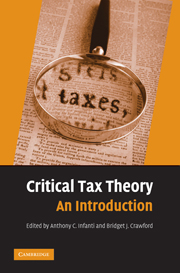Book contents
- Frontmatter
- Contents
- List of Illustrations
- List of Tables
- List of Contributors
- List of Common Abbreviations
- Introduction
- CHAPTER 1 FOUNDATIONS OF CRITICAL TAX THEORY
- CHAPTER 2 HISTORICAL PERSPECTIVES ON TAXATION
- CHAPTER 3 THE GOALS OF TAX POLICY
- CHAPTER 4 CRITICAL TAX THEORY MEETS PRACTICE
- CHAPTER 5 RACE AND TAXATION
- CHAPTER 6 GENDER AND TAXATION
- CHAPTER 7 SEXUAL ORIENTATION AND TAXATION
- CHAPTER 8 THE FAMILY AND TAXATION
- CHAPTER 9 CLASS AND TAXATION
- CHAPTER 10 DISABILITY AND TAXATION
- CHAPTER 11 GLOBAL CRITICAL PERSPECTIVES ON TAXATION
- CHAPTER 12 CRITICAL PERSPECTIVES ON CRITICAL TAX THEORY
- Index
CHAPTER 3 - THE GOALS OF TAX POLICY
Published online by Cambridge University Press: 04 August 2010
- Frontmatter
- Contents
- List of Illustrations
- List of Tables
- List of Contributors
- List of Common Abbreviations
- Introduction
- CHAPTER 1 FOUNDATIONS OF CRITICAL TAX THEORY
- CHAPTER 2 HISTORICAL PERSPECTIVES ON TAXATION
- CHAPTER 3 THE GOALS OF TAX POLICY
- CHAPTER 4 CRITICAL TAX THEORY MEETS PRACTICE
- CHAPTER 5 RACE AND TAXATION
- CHAPTER 6 GENDER AND TAXATION
- CHAPTER 7 SEXUAL ORIENTATION AND TAXATION
- CHAPTER 8 THE FAMILY AND TAXATION
- CHAPTER 9 CLASS AND TAXATION
- CHAPTER 10 DISABILITY AND TAXATION
- CHAPTER 11 GLOBAL CRITICAL PERSPECTIVES ON TAXATION
- CHAPTER 12 CRITICAL PERSPECTIVES ON CRITICAL TAX THEORY
- Index
Summary
Critical tax scholars face a high hurdle to gaining entry into – and thus influence on – mainstream tax policy debates. The hurdle is the conventional wisdom that tax policy is a neutral terrain on which experts engage in technical, quasi-scientific debates about the optimally efficient distribution of the tax burden. For those who accept this conventional wisdom, emotionally and ideologically charged topics – such as race, ethnicity, gender, sexual orientation, class, and disability – simply have no place in tax policy discussions. These topics are best discussed – and social problems related to them are best resolved – outside of the tax realm.
In their contributions to this chapter, Dorothy Brown, Lisa Philipps, and Nancy Staudt reexamine different aspects of this conventional wisdom and undermine it in ways that may help critical tax scholars to gain entry into (and influence on) mainstream tax policy discussions. First, in Racial Equality in the Twenty-First Century: What's Tax Policy Got to Do with It?, Brown questions the notion that the U.S. tax system is neutral with regard to race. In the excerpted portion of her article, Brown explores how the federal government, on the one hand, subsidizes employers who engage in race discrimination by allowing them to deduct employment discrimination damage awards, but, on the other hand, adds to the injuries suffered by the victims of employment discrimination by requiring them to pay tax on those same awards. Brown proposes several changes to the tax laws that would rectify this problem and discourage employers from discriminating on the basis of race.
- Type
- Chapter
- Information
- Critical Tax TheoryAn Introduction, pp. 39 - 41Publisher: Cambridge University PressPrint publication year: 2009

